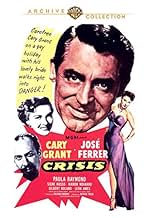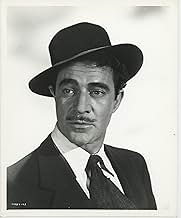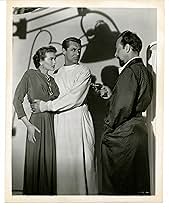IMDb RATING
6.7/10
2K
YOUR RATING
While on vacation in a Latin American country, an American neurosurgeon and his wife become tangled in a revolutionary uprising against a tyrannical dictator.While on vacation in a Latin American country, an American neurosurgeon and his wife become tangled in a revolutionary uprising against a tyrannical dictator.While on vacation in a Latin American country, an American neurosurgeon and his wife become tangled in a revolutionary uprising against a tyrannical dictator.
- Awards
- 1 win total
José Ferrer
- Raoul Farrago
- (as Jose Ferrer)
Lillian Adams
- Nurse
- (uncredited)
Carlos Barbe
- Friend of Farrago
- (uncredited)
Orlando Beltran
- Doctor's Assistant
- (uncredited)
Audrey Betz
- Servant
- (uncredited)
George Brady
- Student
- (uncredited)
Robert Cabal
- Very Young Man
- (uncredited)
Andy Carillo
- Man at Table
- (uncredited)
Bridget Carr
- Guest
- (uncredited)
Teresa Celli
- Rosa Aldana
- (uncredited)
Carlos Conde
- Man
- (uncredited)
Rita Conde
- Pretty Woman
- (uncredited)
- Director
- Writers
- All cast & crew
- Production, box office & more at IMDbPro
Featured reviews
I first saw this movie in 1950 when it was released. I thought it was a good drama, more or less accurately portraying many of the problems of Latin American governments, with good dialog particularly between the two male leads. Incidentally, I did not find either character particularly sympathetic, but no matter. Many of the comments here have mentioned the resemblance to Eva Peron of the Signe Hasso character. Just an interesting observation: In the much later made for TV movie, Evita Peron, Signe Hasso and Jose Ferrer both had roles. He was the tango singer who seduced Evita and took her to Buenos Aires. She was the aging actress who befriended the young Dva Duarte and found herself in a jail cell. Of the two movies, Crisis is by far the better film. Evita Peron was a ripoff.
"Crisis" is a study in how a strong supporting cast can make a movie complete. While Grant and Ferrer give powerful performances, they are enhanced by even better performances by Signe Hasso and Ramon Navarro. The latter two, with subtle, understated characterizations, round out a thoughtful script and cast. The story is compelling -- medical/ethical conflict, interwoven with a political drama which doesn't attempt to sway. It does provide a backdrop which doesn't interfere but enhances.
This is Richard Brooks' first directorial effort. Examining the work half a century after it was made, the film presents a director who knows how to get the most from his actors through the written word and the way it is spoken. Three actors sparkle: Cary Grant, Jose Ferrer, and Signe Hasso.
Compare Cary Grant's acting in the Hitchcock vehicles and in this. Grant presents a maturity in his speech patterns that do not show up under Hitchcock's direction. I think much of the quality of the performances is probably due to the director who took his first film seriously--probably a lot more than he did in his later career.
All in all, this is a curious film--quite unusual in several ways compared to the average Hollywood products in the Fifties. Is it only a question of humanism winning over all evils? Or more?
Compare Cary Grant's acting in the Hitchcock vehicles and in this. Grant presents a maturity in his speech patterns that do not show up under Hitchcock's direction. I think much of the quality of the performances is probably due to the director who took his first film seriously--probably a lot more than he did in his later career.
All in all, this is a curious film--quite unusual in several ways compared to the average Hollywood products in the Fifties. Is it only a question of humanism winning over all evils? Or more?
CRISIS remains perhaps the only film that is completely forgotten when lists of Cary Grant films are offered. Even some of Grant's lesser vehicles are discussed, in depth, but Richard Brooks' CRISIS, which features a really stellar cast is 'lost' in contemporary cinema circles. There is no logical reason for this. Grant gives one of his very rare straight dramatic performances -- and one very very different from the dramatic range in NONE BUT THE LONELY HEART. It is a strong, forthright piece of work. The film deserves rediscovery for any number of reasons -- Grant's work, the first sign of Brooks' major talent... and one of the few (if only) Grant films that deals with modern political issues. I had remembered the film very well from my youth and never saw it listed for TV showings or any retrospectives. Thus, finding a rare DVD copy was wonderful ... and, surprisingly, very rewarding. Here's to someone pulling CRISIS out of obscurity and into a rung on the Cary Grant pantheon.
Cary Grant stars as a famous neurosurgeon who is vacationing in a South American country with his new bride. The pair are subject to a "friendly abduction" when the current president of that country, Raoul Farrago (Jose Ferrer), learns of his presence. You see, the president has a brain tumor, and due to the fact that his country is on the verge of civil war, he dares not travel to another country for the operation he needs to save his life.
Farrago is a tyrant who claims that he must be so because democracy would never work in his country. His people are illiterate children, he says, and wouldn't know what to do with freedom if they had it. However, being a national "father image" doesn't prevent the president from stealing everything in the country that isn't nailed down. The president's wife does a great job of emulating Evita Peron before much was really known about her. Then there is Gilbert Roland as the leader of the opposition. He wants to make his people free, as long as he gets to be the new dictator. Roland does a great job with this role. How far he has progressed here since his early days as an actor at the dawn of sound.
So the question is - does Grant owe a service to the dictator by saving his life with a delicate operation only so that patient can go on being a killer and a thief, or would the death of this tyrant better serve mankind? If you throw the safety of his wife into the balance - what decision does the doctor make?
Farrago is a tyrant who claims that he must be so because democracy would never work in his country. His people are illiterate children, he says, and wouldn't know what to do with freedom if they had it. However, being a national "father image" doesn't prevent the president from stealing everything in the country that isn't nailed down. The president's wife does a great job of emulating Evita Peron before much was really known about her. Then there is Gilbert Roland as the leader of the opposition. He wants to make his people free, as long as he gets to be the new dictator. Roland does a great job with this role. How far he has progressed here since his early days as an actor at the dawn of sound.
So the question is - does Grant owe a service to the dictator by saving his life with a delicate operation only so that patient can go on being a killer and a thief, or would the death of this tyrant better serve mankind? If you throw the safety of his wife into the balance - what decision does the doctor make?
Did you know
- TriviaOriginally banned in Mexico, Central and South America.
- GoofsThe doctor announces his fee is ten percent of the patient's income, but does not say whether this means monthly, annual or some other period.
- Quotes
Raoul Farrago: At least permit me to thank you. You have done a great service not only to me but to the people of my country.
Dr. Eugene Norland Ferguson: I only saved your life I didn't vote for you.
Raoul Farrago: Neither did they.
[smiling]
- Crazy creditsPROLOGUE: "The time is now. The scene of the action is fictitious, but the forces at play in this story are not fictitious."
- Alternate versionsAlso available in a computer colorized version.
- ConnectionsReferenced in Secret Publicity - Forbes Taylor Remembers the Making of State Secret (2021)
- How long is Crisis?Powered by Alexa
Details
Box office
- Budget
- $1,616,455 (estimated)
- Runtime
- 1h 35m(95 min)
- Color
- Aspect ratio
- 1.37 : 1
Contribute to this page
Suggest an edit or add missing content

































